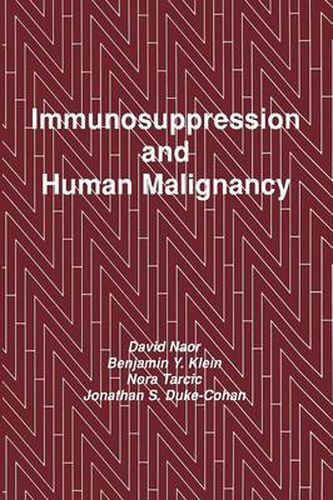Immunosuppression and Human Malignancy
David Naor,Benjamin Y. Klein,Nora Tarcic,Jonathan S. Duke-Cohan,Nora Tarcic

Immunosuppression and Human Malignancy
David Naor,Benjamin Y. Klein,Nora Tarcic,Jonathan S. Duke-Cohan,Nora Tarcic
This title is printed to order. This book may have been self-published. If so, we cannot guarantee the quality of the content. In the main most books will have gone through the editing process however some may not. We therefore suggest that you be aware of this before ordering this book. If in doubt check either the author or publisher’s details as we are unable to accept any returns unless they are faulty. Please contact us if you have any questions.
The immune system can deal effectively with the majority of viruses and bacteria, less effectively with parasites, and very poorly with cancer. Why is this so? Why are McFarlane Burnet’s and Lewis Thomas’ predictions that the immune system is in volved in ridding the body of cancer cells, encapsulated in the catchy phrase immunologic surveillance, so difficult to experi mentally establish? Cancer differs from infectious agents in being derived from the host. Hence, it has been postulated that cancer cells lack anti gens that the immune system can recognize. They are not im munogenic.
However, this argument is seriously weakened by the existence of numerous human autoimmune diseases, in which the immune system effectively recognizes and attacks a va riety of self tissues. Thus, the potential clearly exists for recogni tion of the surfaces of tumor cells. Professor Naor and his colleagues have written a book that explores another possible reason: cancer cells are recognized by the immune system-but is it possible that the consequence of recognition is inhibition of the immune system-by suppressor T cells or macrophages? The evolution of the malignant state may only occur in individuals who develop this suppression. This book reviews the evidence that suppressor cells, poorly characterized and difficult to study, may be of fundamental im portance in cancer. In fact, our incapacity to understand the na ture of suppressor cells and their mode of action is one of the ma jor problems in immunology research today.
This item is not currently in-stock. It can be ordered online and is expected to ship in 7-14 days
Our stock data is updated periodically, and availability may change throughout the day for in-demand items. Please call the relevant shop for the most current stock information. Prices are subject to change without notice.
Sign in or become a Readings Member to add this title to a wishlist.


